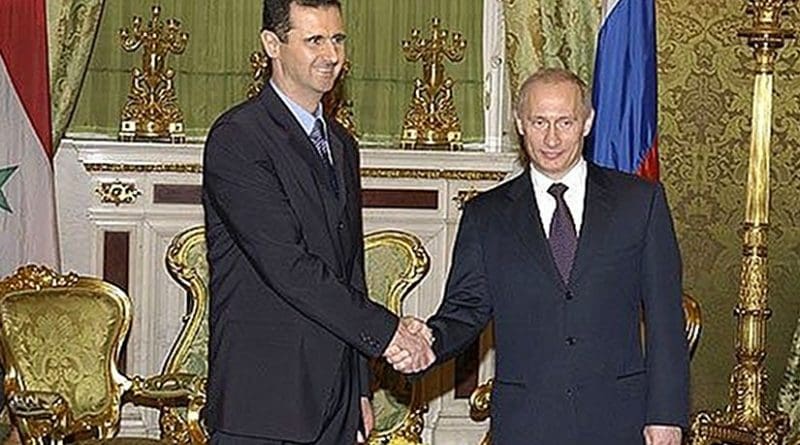Putin, Assad And The Nexus Of Torture And Terror – OpEd
By Paul Woodward - War in Context
Last October, Patrick Cockburn welcomed the arrival of Russian forces in Syria, suggesting that the “intervention of Russia could be positive in de-escalating the war”. He wrote:
Overall, it is better to have Russia fully involved in Syria than on the sidelines so it has the opportunity to help regain control over a situation that long ago spun out of control. It can keep Assad in power in Damascus, but the power to do so means that it can also modify his behaviour and force movement towards reducing violence, local ceasefires and sharing power regionally.
Posturing as a neutral observer, Cockburn no doubt preferred the language of “de-escalation” rather than military solutions, yet having noted that “Russia is at least a heavy hitter, capable of shaping events by its own actions,” he could hardly have been surprised by the massive onslaught on Aleppo over the last few days.
After Obama’s hollow demands for Assad’s departure, Washington has now moved towards what almost amounts to a quiet alliance with the regime by shutting down what was left of a meager weapons supply to rebel groups.
As Emile Hokayem writes:
Just as Russia escalates politically and militarily, the Obama administration is cynically de-escalating, and asking its allies to do so as well. This is weakening rebel groups that rely on supply networks that the U.S. oversees: In the south, the United States has demanded a decrease in weapons deliveries to the Southern Front, while in the north, the Turkey-based operations room is reportedly dormant.
The result is a widespread and understandable feeling of betrayal in the rebellion, whose U.S.-friendly elements are increasingly losing face within opposition circles. This could have the ironic effect of fragmenting the rebellion — after years of Western governments bemoaning the divisions between these very same groups.
Assad is far from being able to declare he has won the war, but he is close to winning the argument about how it gets framed.
He always claimed that he was fighting terrorism — deploying the rhetorical gift which neoconservatism freely bestowed on authoritarian rulers around the globe after 9/11 — and before long, it looks like this is how the war in Syria will neatly be defined: the regime vs ISIS and al Qaeda. And that’s a fight Assad has no interest in winning.
Nevertheless, it’s worth being reminded why the continuation of Assad’s rule should not be mistaken as a harbinger of peace. If a year or two from now, violence no longer rains down from the sky in the form of barrel bombs and Russian airstrikes, it will most likely continue without restraint in the domain where this regime has always exercised its ruthless power: by imprisoning, torturing, and murdering its opponents.
In “Out of Sight, Out of Mind: Deaths in Detention in the Syrian Arab Republic,” a newly released report for the UN Human Rights Council, we learn:
Interrogators and guards employed gruesome methods of torture to kill detainees. In 2014, a detainee held in a centre under the control of the 4th Division of the Syrian army had his genitals mutilated during torture. Bleeding severely and left without treatment, he died three days later. A detainee of a Military Security branch in Homs witnessed an elderly man being severely beaten, and then hung by his wrists from the ceiling. The guards burned his eyes with a cigarette, and pierced his body with a heated, sharp metal object. After hanging in the same position for three hours, the man died.
Other detainees died as a result of injuries and wounds sustained during torture. Victims received little or no medical care to treat the wounds and developed severe infections that eventually led to their demise. In the Air Force Intelligence Branch in Aleppo, a detainee suffered severely from an infected wound in his leg sustained during torture. Unable to stand up, he was eventually placed in the corridor outside the cell, receiving no medical care. After a few days, fellow detainees observed that he was dead. His family was later able to obtain the body through unofficial channels. Due to marks of torture and the severe emaciation of his corpse, his family could first only recognise him by an identifying tag. A 15-year-old boy detained in 2013 by the 4th Division in a detention facility near Yafour (Rif Damascus) reported seeing several male detainees dying due to torture and inhuman prison conditions and denial of medical assistance.
A large number of deaths were caused by the squalid conditions in which detainees were kept. Prison conditions were similar across detention facilities. They included severely overcrowded cells where prisoners were often forced to stand and sleep in shifts, stripped to their underwear. Lack of clean drinking water, sanitation, lice infestations and other unhygienic conditions caused the spread of disease and infections. Many prisoners were forced to use their toilet as a source of drinking water.
Anyone who believes this is “the lesser of two evils” or the kind of toughness required for “stability,” is delusional.
On the contrary, this type of institutionalized violence has long had an instrumental role in fostering terrorism.


Nyet. If you want Cambodia on the Turks border. We have to step up. Clinton the Balkans. We will kill people. No more refugees. Morally we just cannot accept such inhumanity. We have to arch up and back up.